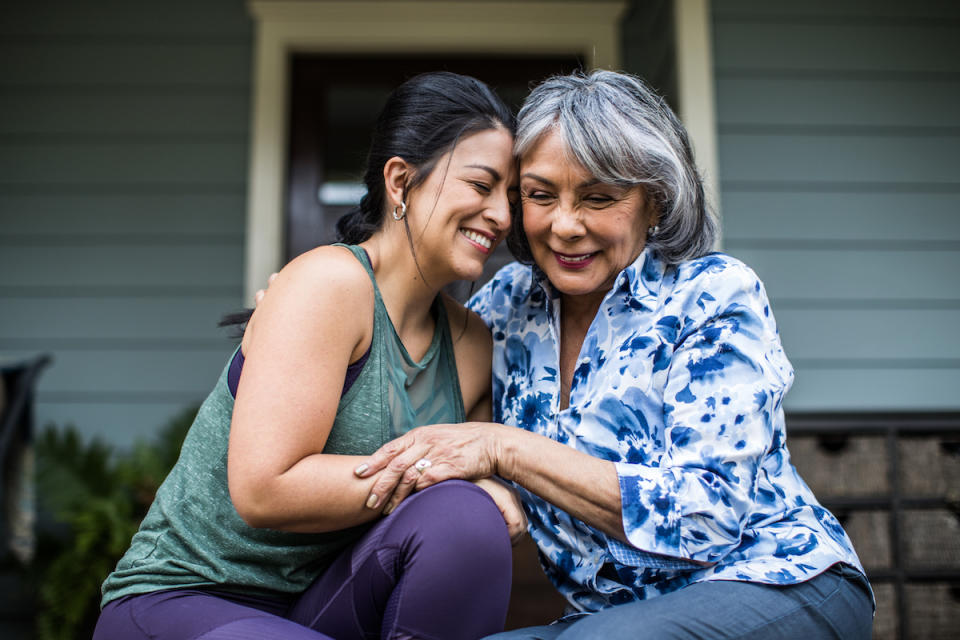Experts Share Their Best Tips for How to Get Along With Your Adult Children
Children bring joy and meaning to our lives, but as they grow into adults and lead independent lives, it can become difficult to maintain the same bonds you had when they were young. Whether you're looking to grow closer with your adult children or to set stricter limits with them, we've gathered expert insights on empowering ways to bridge distances and cultivate stronger ties — so both you and your kids can have a happy, well-balanced relationship that will stay strong for years to come.
How to grow closer with your adult children
1. Pick up pom poms
When it comes to your adult kids, consider taking on the role of “fan” rather than “advisor,” says Tina Gilbertson, psychotherapist and author of Reconnecting With Your Estranged Adult Child.
“It’s rare for ordinary people to have fans, but as a parent you can play that part because you’re already so emotionally invested in them,” she explains, adding that adult children no longer need the guardrails they may have benefited from when they were growing up.
Related: Feeling Unappreciated? Here’s How To Feel More Valued by Those Closest to You

“Trust that you’re already instilled the values and morals you’d like them to aspire to — somewhere inside them is all you’ve taught them,” says Gilbertson. In other words, rather than stepping behind the parental pulpit to guide them, have faith that you did a great job raising them and simply pick up a pair of proverbial pom poms to support them and encourage their efforts, as their number one cheerleader.
2. Do more for yourself
“Parents often don’t realize that whatever they do to improve themselves tends to improve the relationship with their adult children,” says Gilbertson. “If you have abandonment wounds from your childhood, for example, your feelings about this are going to come out around your children, so that if they step away or want some space as adults, you may feel personally rejected.”
Showing yourself compassion and validating your emotions by reminding yourself of the reasons you feel as you do will have a downstream effect on your relationship with your kids. As you become happier and more confident, your relationship with them will also flourish.
3. Connect with humor
Wish your kids would call or text more often? If they’re more distant than you’d like, it may just be because they’re secure in your bond. “The more attached they are to us, the tougher it is to leave and spread their wings, so they often have to work harder at being distant — that’s why they don’t always respond to us as quickly as we’d like,” says Jane Isay, parenting expert and author of Unconditional Love: A Guide to Navigating the Joys and Challenges of Being a Grandparent Today.
Isay recommends connecting with your grown-up kiddos through two God-given gifts: your sense of humor and your thumbs. “Text them a funny cartoon or a humorous anecdote about a relative,” she suggests, explaining that this a great way to keep the lines of communication open without pressuring them to respond.
Related: How to Be a Better Friend + Make New Ones: Experts Share 6 Ways to Boost Your Bonds

She adds that another way to bond with them is through your grandchildren. “I play Wordle with my grandkids and talk to them about their newest hobbies. It helps keep the narrative with my adult sons going: I’ll tell them, ‘Did you know that your kids are interested in X or Y?’” Often when we don’t ask for or demand a reply from our kids, that’s exactly what we get.
How to set limits with your adult children
1. Create financial boundaries
Almost 60% of parents are giving their grown-up children a financial helping hand. “It’s more common than ever for younger generations to have money requests,” confirms Joshua Coleman, PhD, clinical psychologist and author of Rules of Estrangement: Why Adult Children Cut Ties and How to Heal the Conflict. He cites everything from the rising cost of living to the challenges of buying a starter home. The problem is that we often sacrifice our own savings and retirement nest egg in service of our children’s piggy bank.
“Ask yourself if helping them is in line with their aspirations to launch into adulthood, which does require some hardship and risk,” he recommends, adding that your answer is very context specific. If you have the means and your kids are new graduates, for example, helping them with the first and last month’s rent of their first apartment may be a no-brainer, but if it’s too much of a drain on your resources, you may have to create a few boundaries.

“Consider putting it in terms of how much you’re willing to give, by saying something like, ‘I have contributed X amount this year, but we need to save more for retirement, so that you’re not in the position of helping us down the line," says Dr. Coleman. Phrasing this financial boundary in terms of your kids’ future selves — and how your limits ultimately benefit them — will help pave the way for better, more honest dynamic.
2. Protect your time around grandkids
You love your grandkids, but if babysitting has become a full-time job, it may be time to create healthy limits around your time. The good news: Over the last four decades, families have become closer than ever, thanks in part to technology making it easier to stay in touch and families having fewer kids — which means parents can lavish more attention on each one.
Related: Experts: Saying ‘Sorry’ Too Much Is Holding Women Back — Here’s What to Say Instead
This also can mean that your adult kids may expect you to drop everything to be there for theirs, notes Dr. Coleman. “You might just say, ‘I love spending time with my grandkids, but I have other things I need to take care of, so maybe we can find another time.’ Or ‘I can see why you’re disappointed that I can’t watch them, but I have to be judicious with my energy and I just need X amount of notice next time.’”
3. Bridge the distance
The other side of putting up boundaries is taking them down. If you’d like to reestablish a connection with an estranged child, consider writing a letter, advises Dr. Coleman. “It’s a very powerful, effective tool, because letters are hard to write.”
Related: Experts Share How To Forgive Someone and Give *Yourself* the Gift of Healing

In other words, they signal just how much thought you’ve put into your decision to reach out. “You might write that you’re ready to listen to them with an open heart and mind, even if you still disagree about certain issues,” he says. “It’s important to meet them where they are.” Indeed, meeting them halfway is often the start of a fulfilling new journey together.
Solve the daily Crossword

